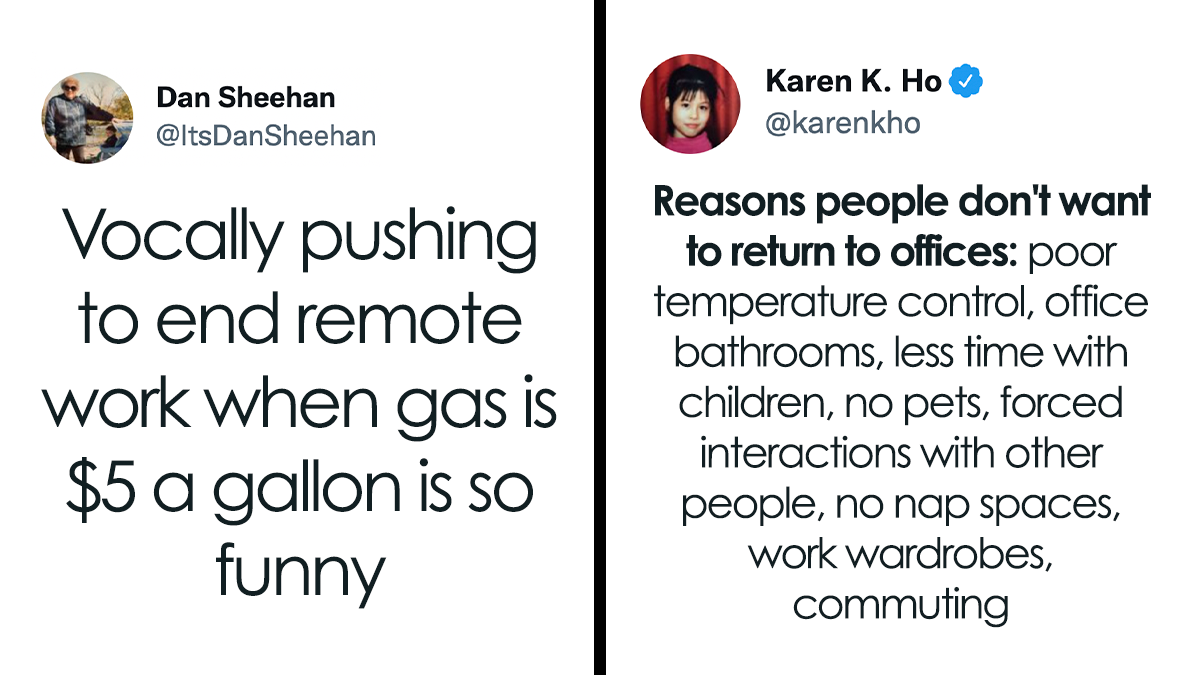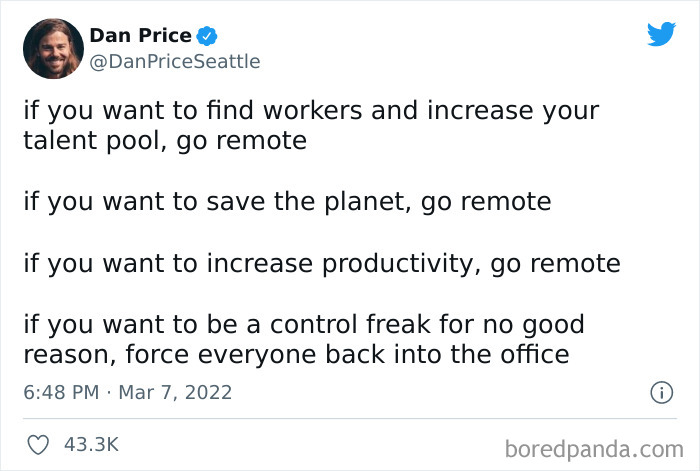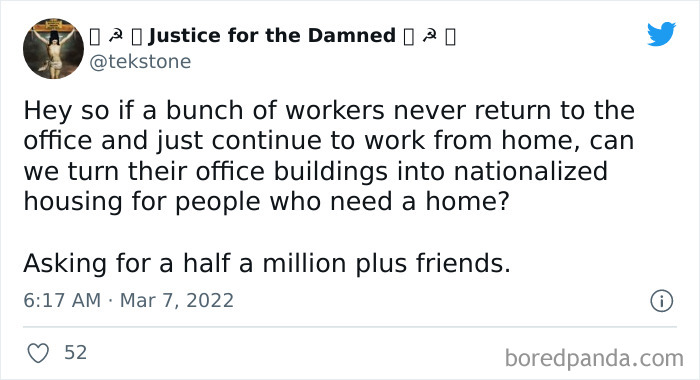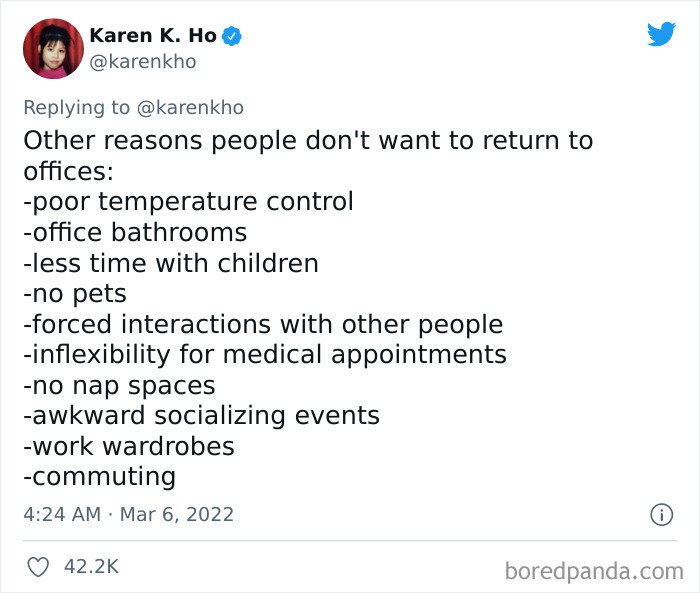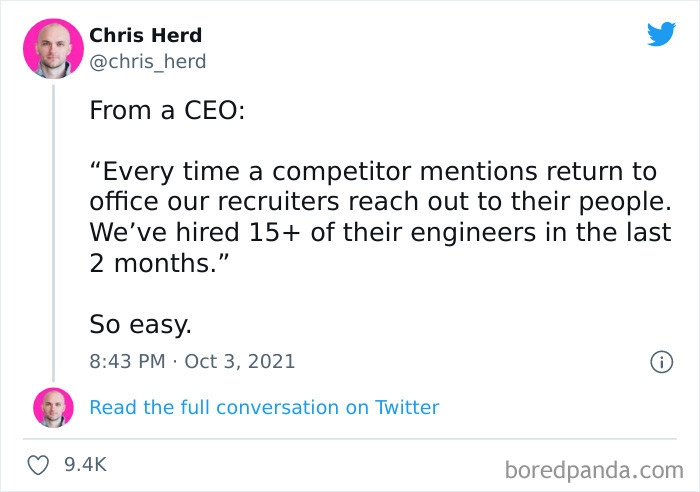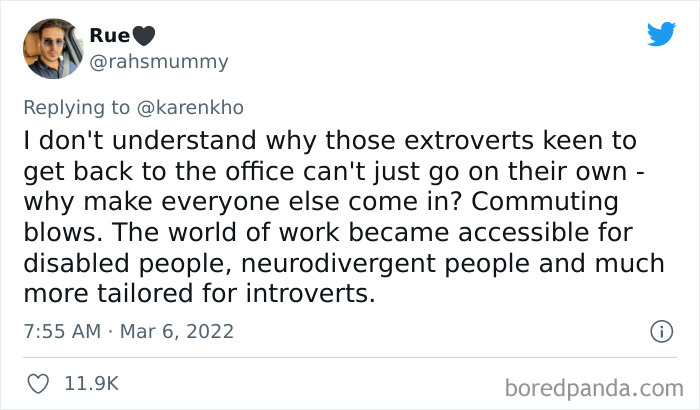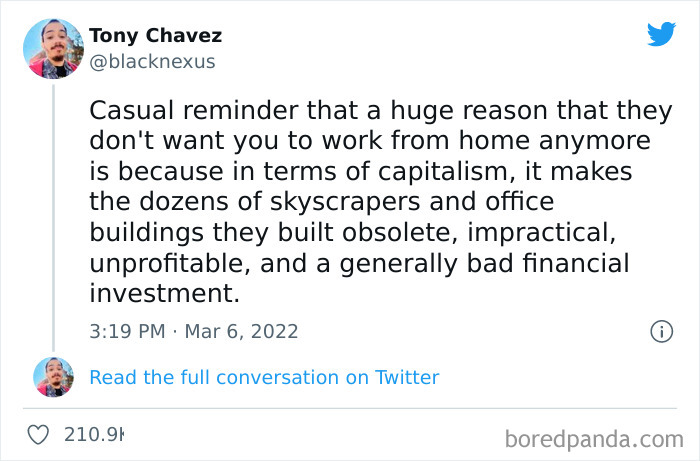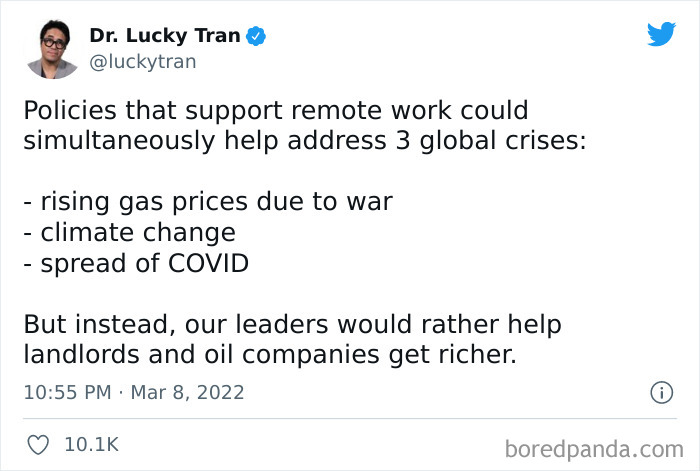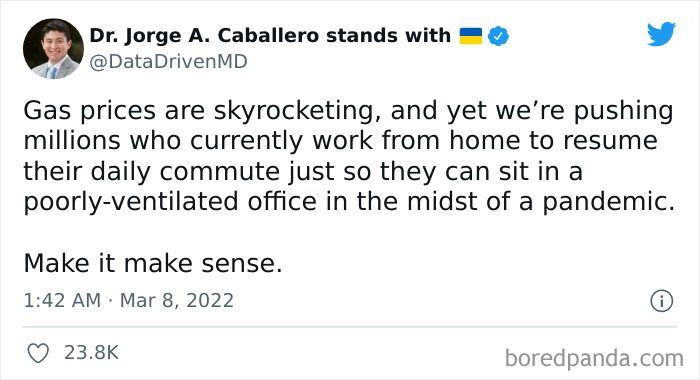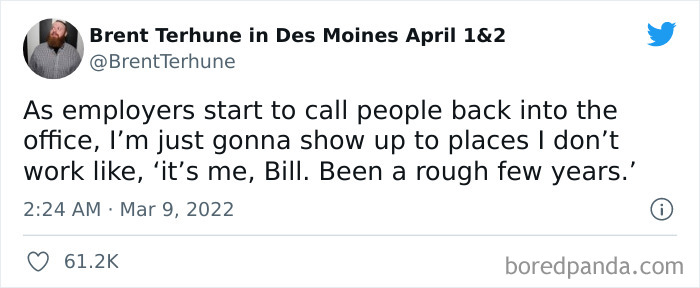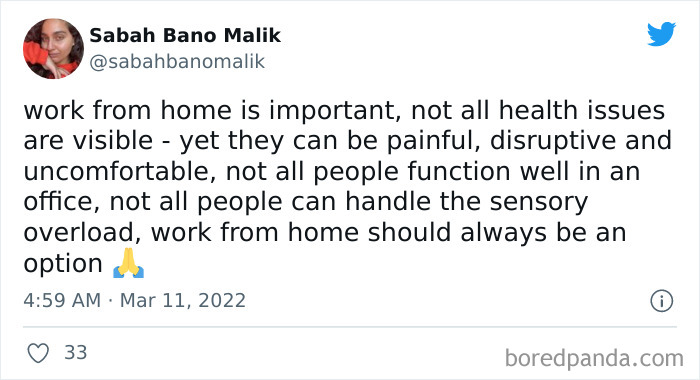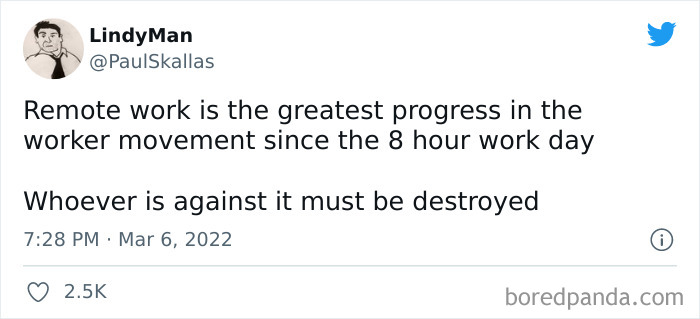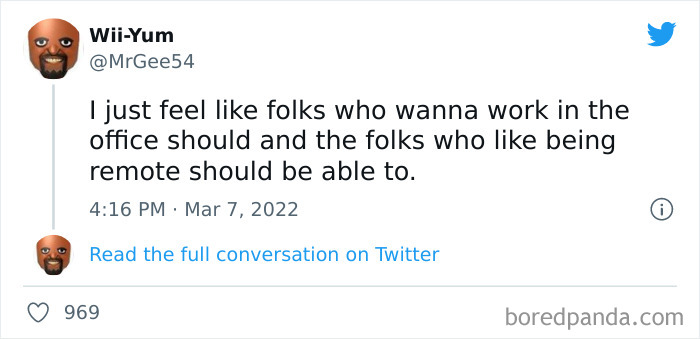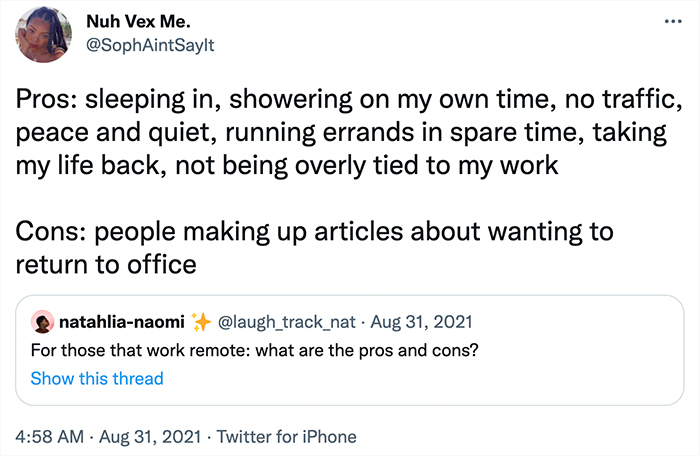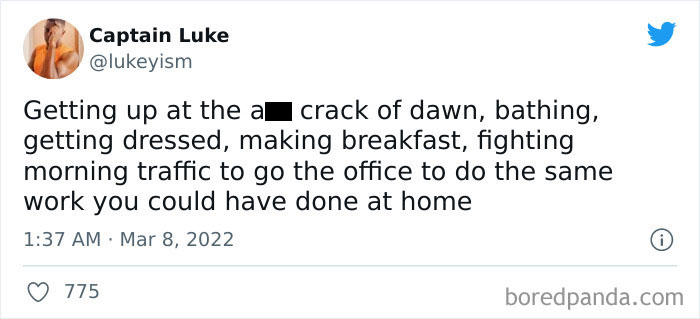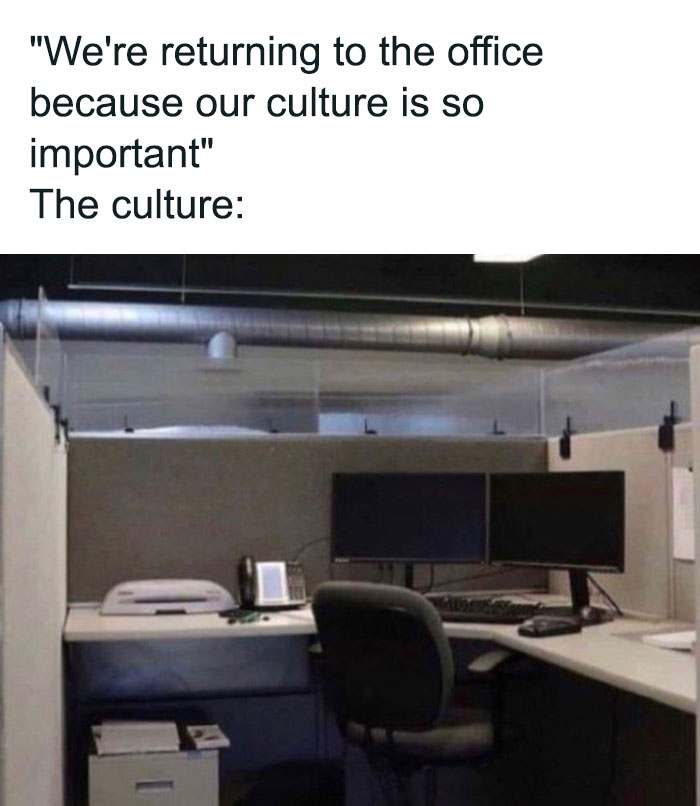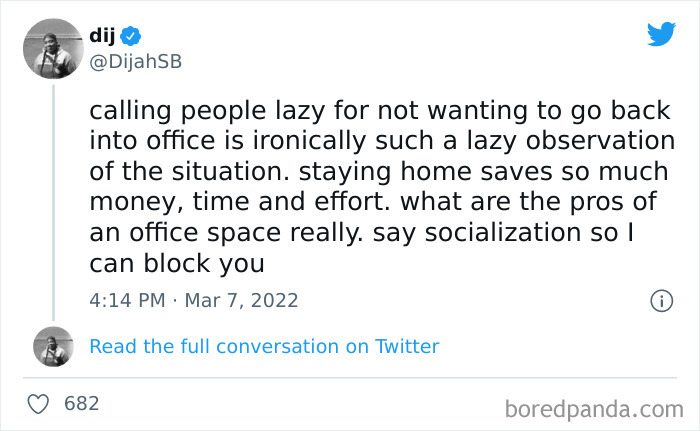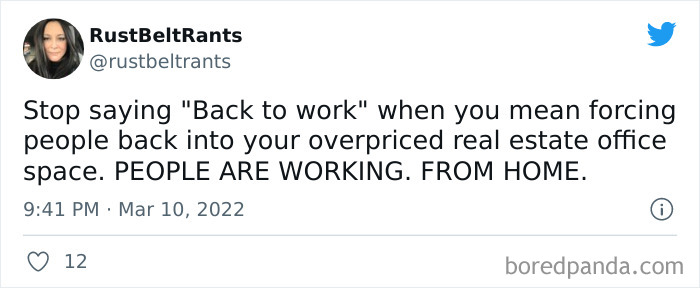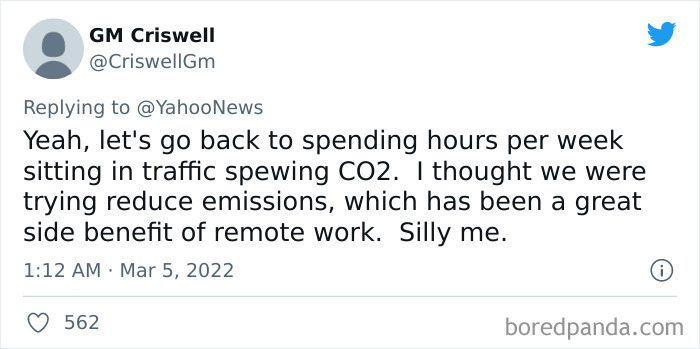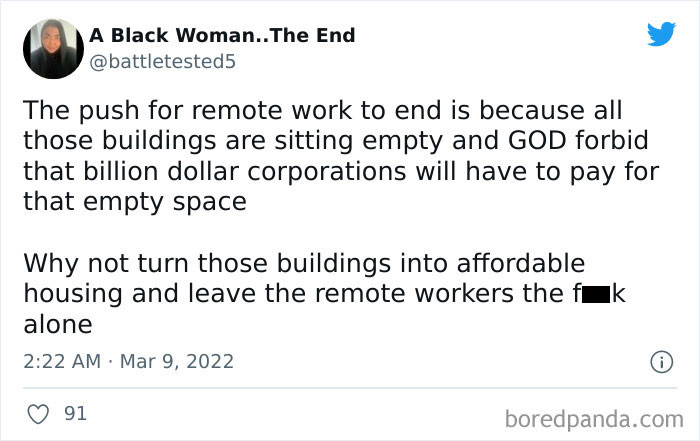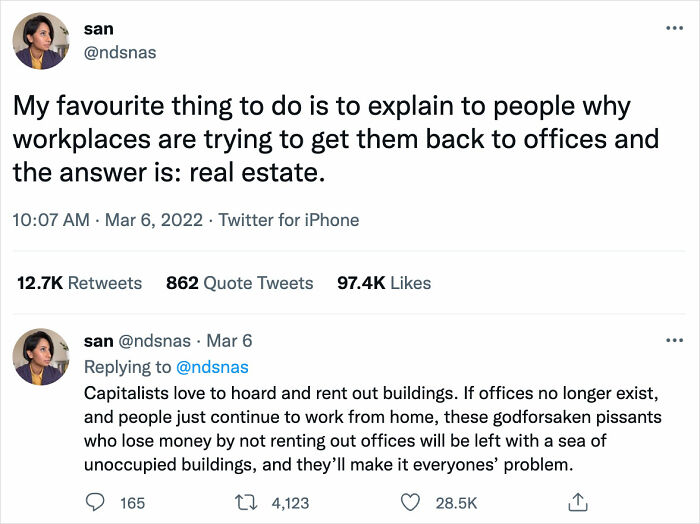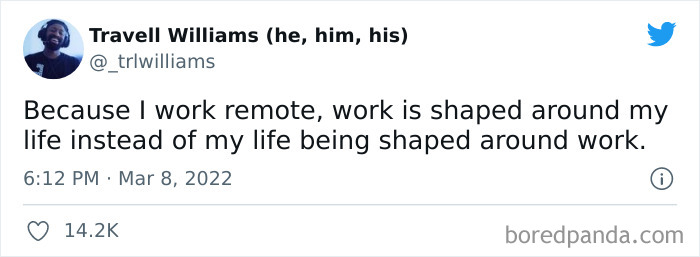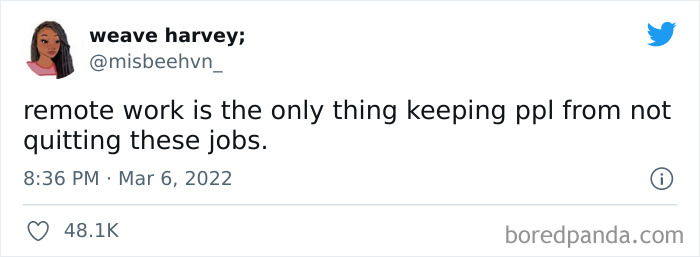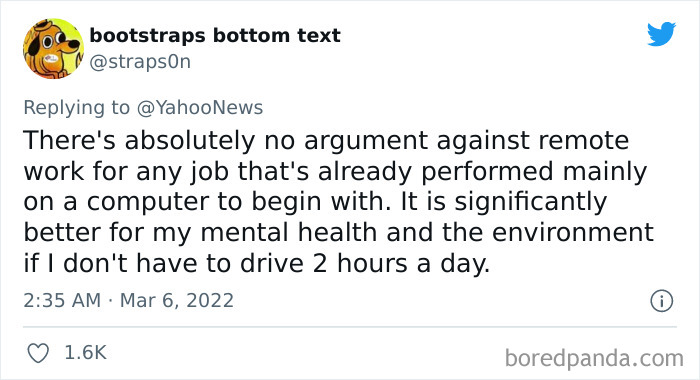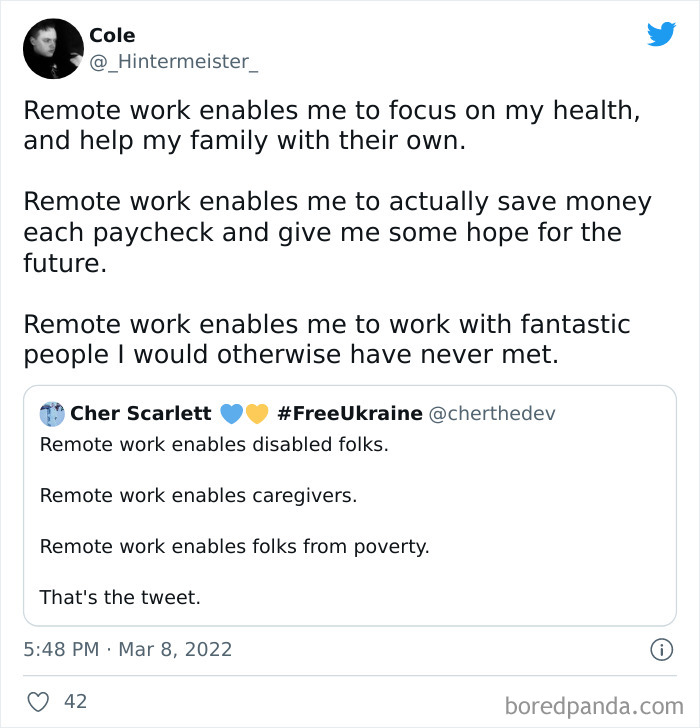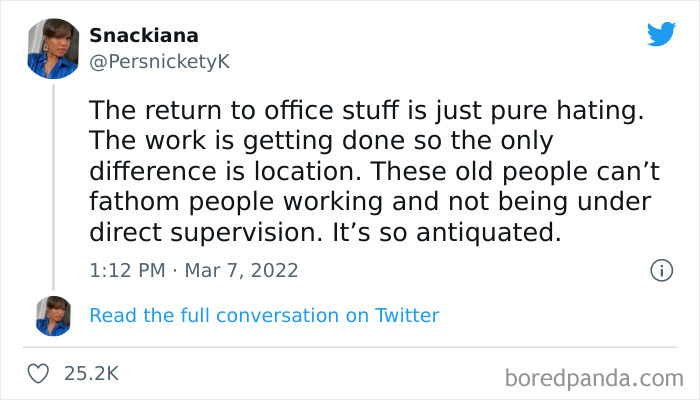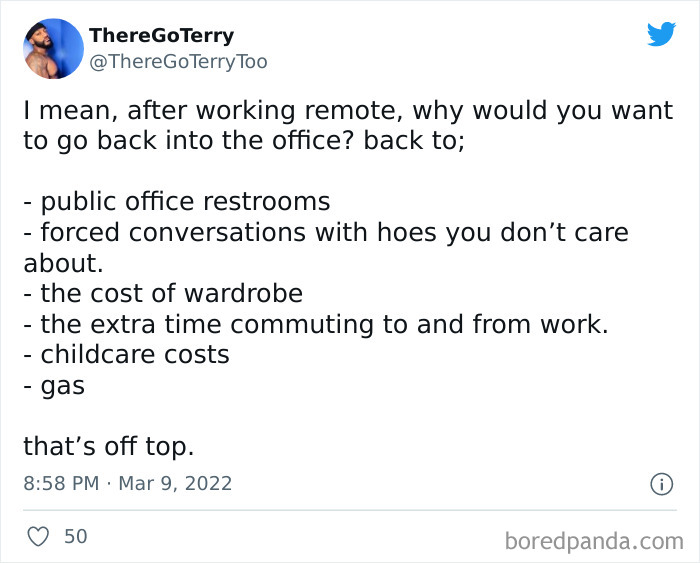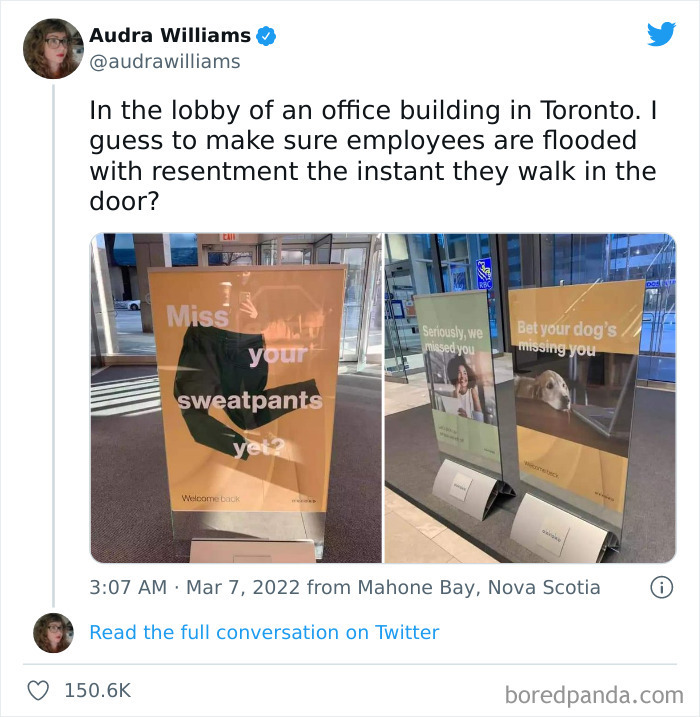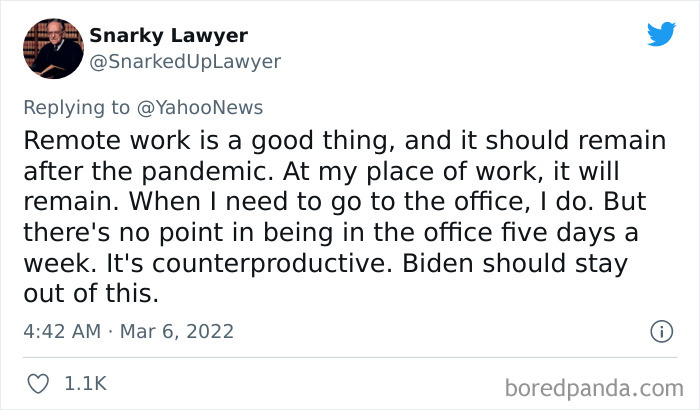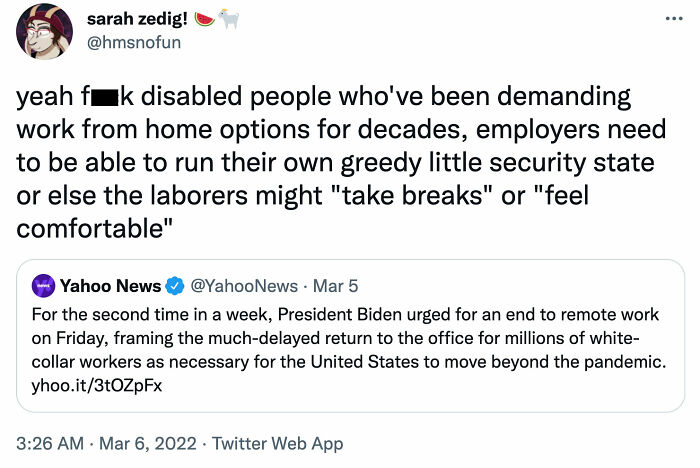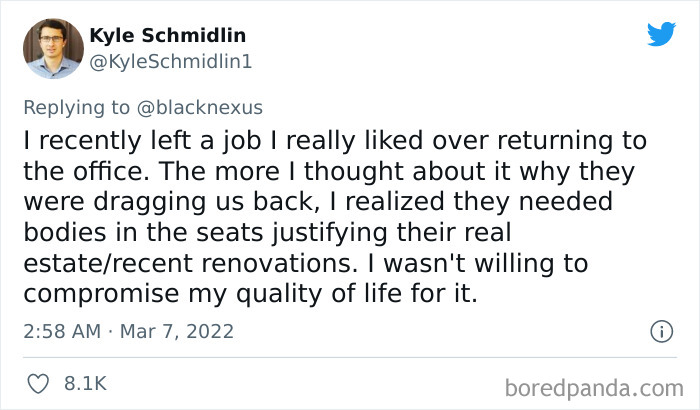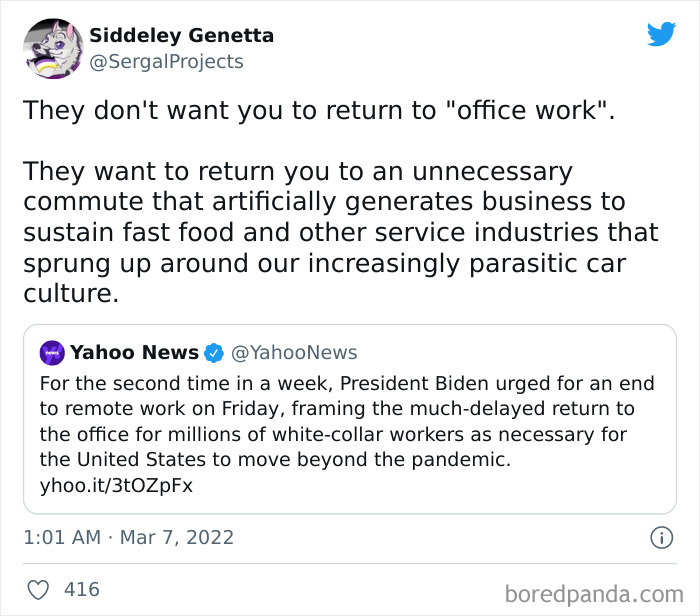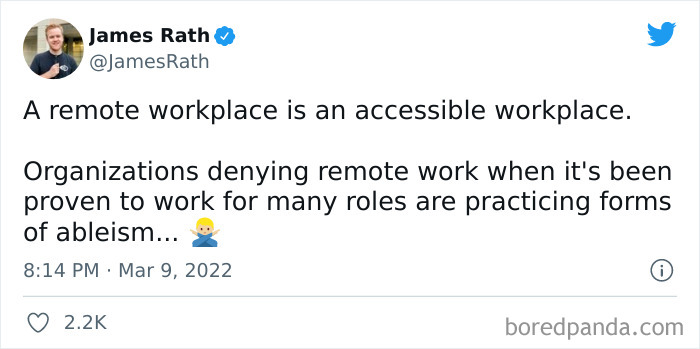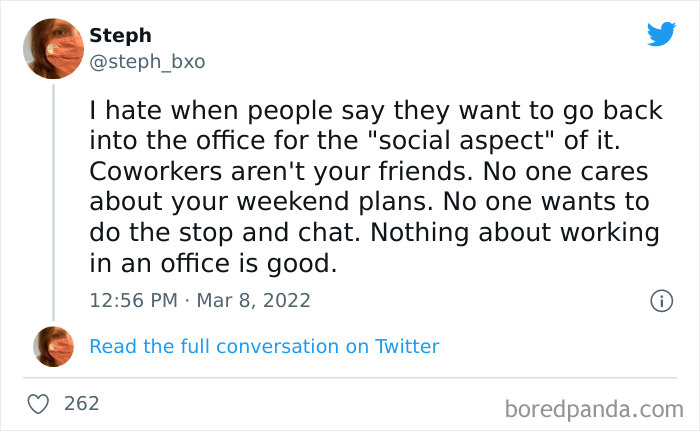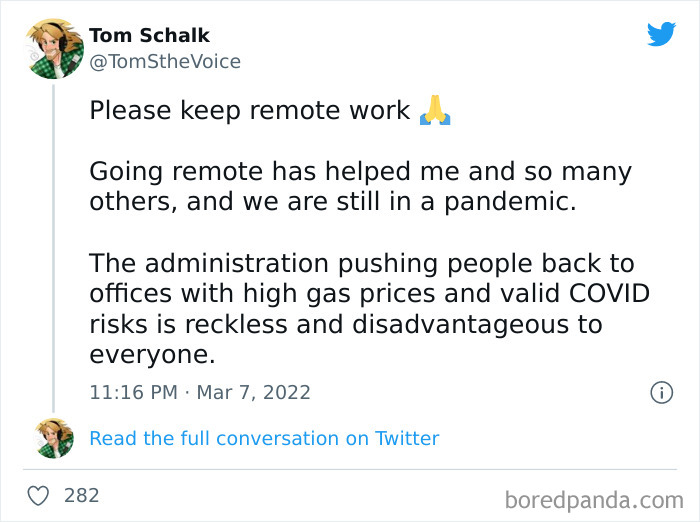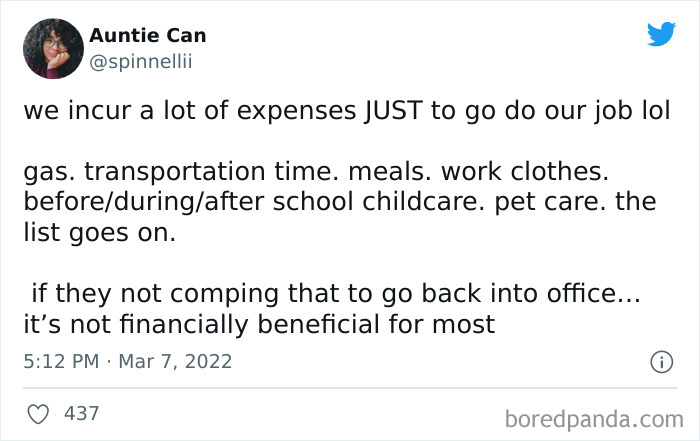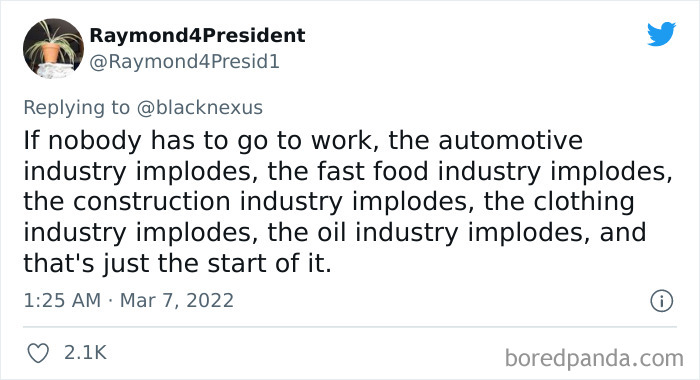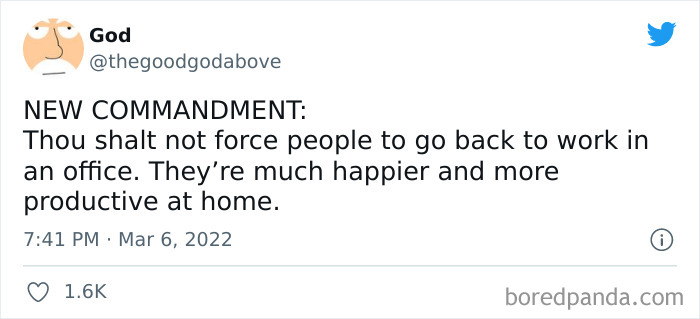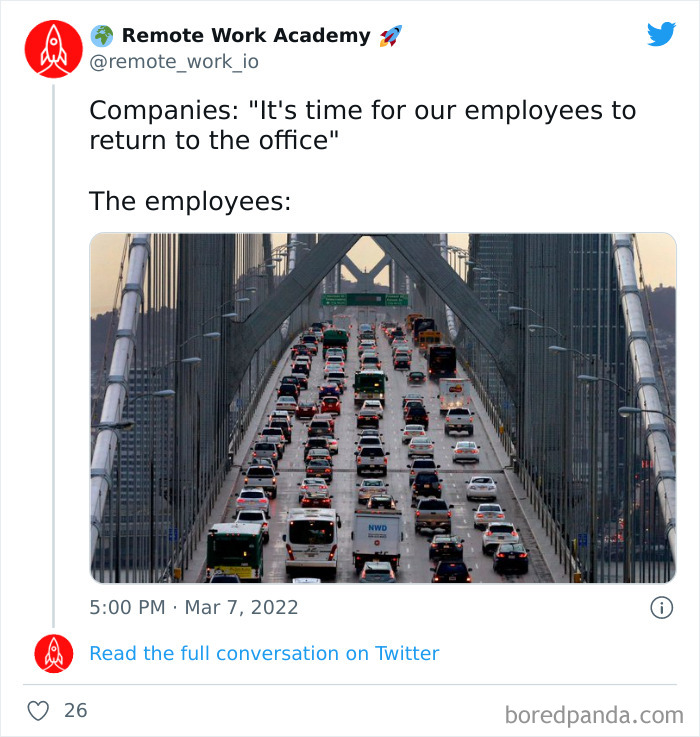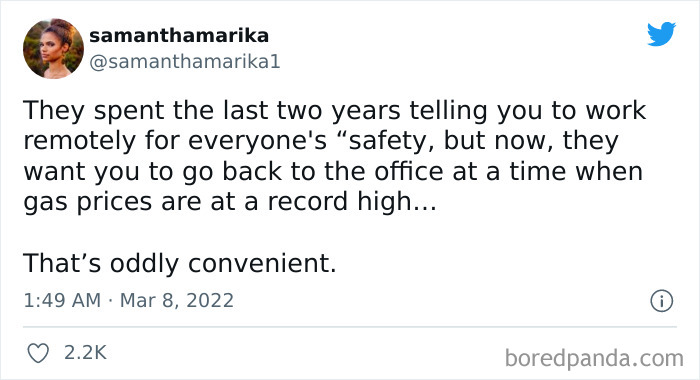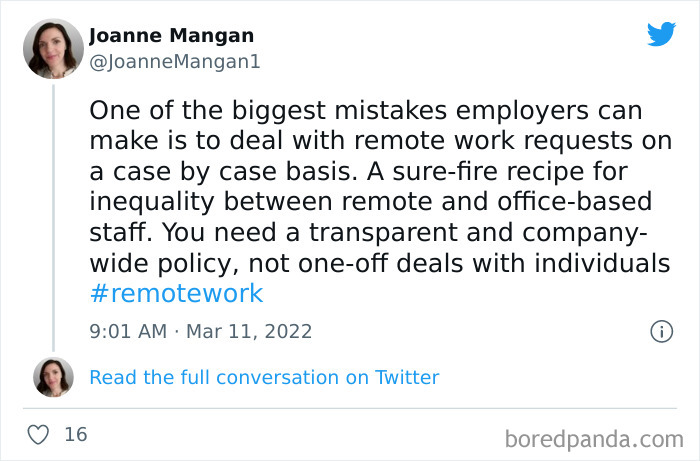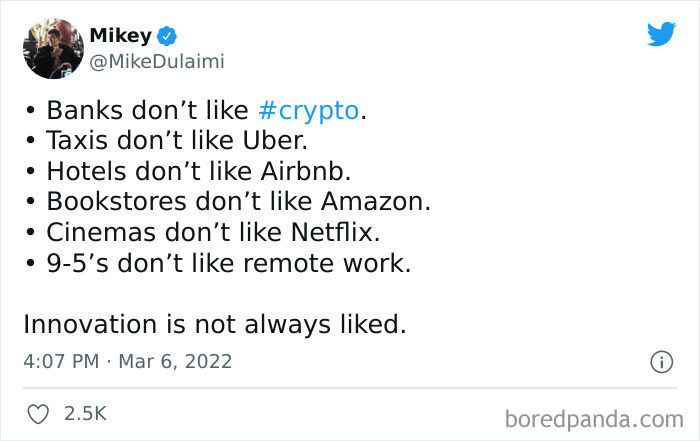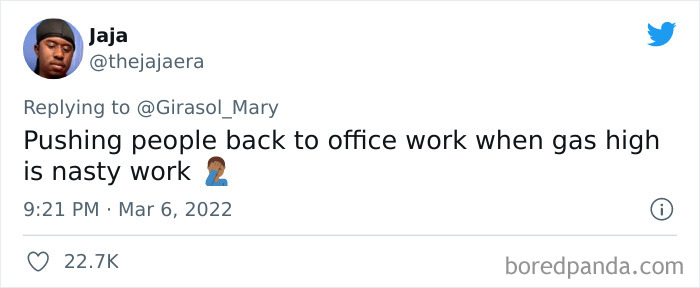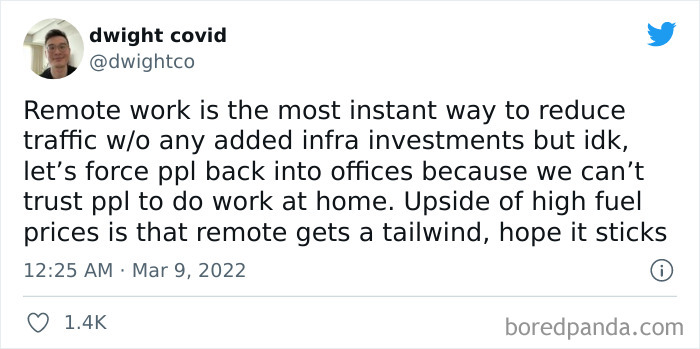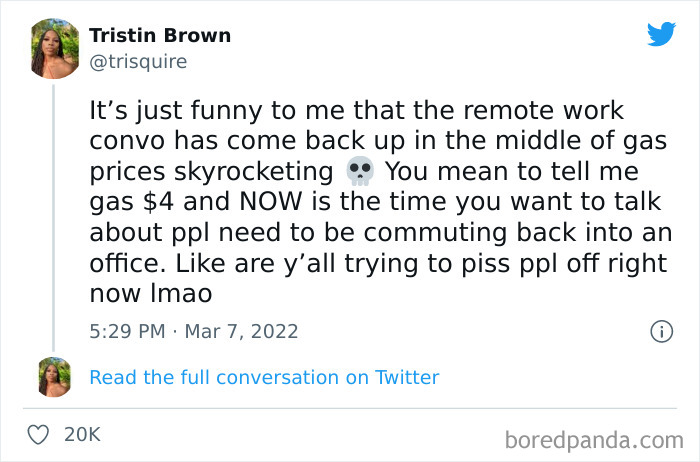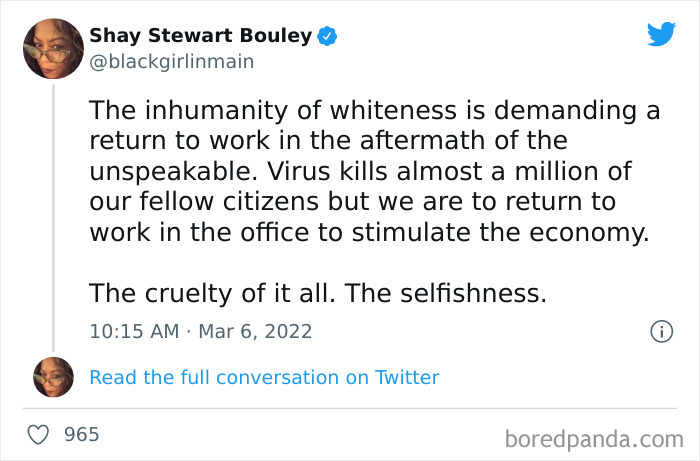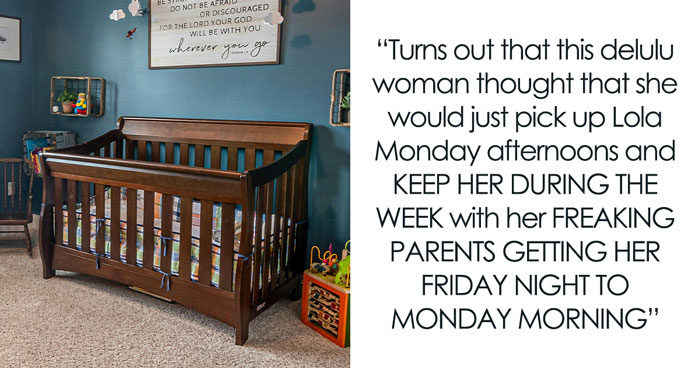President Joe Biden used part of his State of the Union address to urge employees to go back to offices, saying it was time to "fill our great downtowns again."
"We can end the shutdown of schools and businesses," the president claimed. "We have the tools we need."
However, people aren't feeling too psyched about it. With so many having successfully proved they can perform their tasks just as well (if not better) working remotely and gas prices continuing to rise due to Russia's invasion of Ukraine, it's no wonder some don't like the decision. To better understand the reasons why, we took a look at social media where users have been voicing their complaints.
This post may include affiliate links.
Gallup's State of the Workforce study conducted in May/June with more than 9,000 American workers found that 91% of workers in the U.S. working at least some of their hours remotely were hoping their ability to work at home would persist after the pandemic.
Hybrid work was most preferred. Overall, 54% of respondents said they would ideally like to split their time between working at home and in the office. A little over a third (37%) would like to work from home exclusively, while just 9% wanted to return to the office full time.
That's just smart. Especially these days where the employees don't want free pizza Friday and a 20cent raise. They will quit for better conditions, benefits and not being forced to chit chat with random colleagues is a huge massive bonus. I think it's unreasonable to discuss anything not work related in work. I work there, I don't need friends and I have my own family. To point out any company who mentions we are family, RUN. Most families are toxic and dysfunctional even if pleasant there's always some skeletons. I decline to have my own family or work family part of my daily activities. All i come to do is my job for the paid time and then leave, no drinks, no chit chat, no games, after work team building etc. No no no. CEO is right!
Time preservation was the key reason for wanting to work remotely:
Not having to commute, needing the flexibility to balance work and personal obligations, and improved wellbeing (which likely results from having more time) were the top-cited reasons for preferring remote work.
3 in 10 employees working remotely said they are extremely likely to seek another job if their company eliminates remote work.
Where I work, they've divided the "work from the office crowd" in 3 groups. Group 1: those that have to work from the office (they never stopped going in), group 2: those that want to go in the office (they are planning their return) and group 3: those who don't want to go back (we may have to go in once every 2 weeks... maybe...)
Don’t forget public transportation in big cities. They want you to use those as well. Plus the restaurant businesses which survive with office personnel.
Yeah, sorry, but I don't care about the hospitality industries in the city. I'm sick of hearing that argument. I am not an economic unit who works just to pay for overpriced coffee in a badly run city. Where I work from home, all the local cafes and restaurants thrived during our extensive lockdowns. It's the untold story of the past couple of years. That's how the market works.
Load More Replies...Then let those who wish to go to the office go to the office, and let the rest of us TF alone to work at home. Keep public transportation—-in fact, expand it out of the cities so those of us in more rural areas can access it. Remember, not everyone can work from home, so a certain percentage of workers will still need to go into work, and would rather use public transport instead of driving. Hell, even people who live in the sticks, including a lot of those who would have to be physically present at work, need—-or would like—-to go to town, and would rather hop a train than have to drive, risk someone hitting their cars, then be forced to pay to park in expensive lots.
It's fairly easy to convert skyscrapers and office buildings into apartments. In some countries that would deal with the shortage of housing and the ridiculous high rents.
No it's not, and for an interesting reason. Architects and engineers who specialise in retrofitting offices will tell you that most of them aren't designed to provide basic standards for residential properties. They are virtually impossible to get natural light into most of the building, and the airflow is difficult to get right. These are the places where they ask employees to spend most of their lives. They actually aren't for for human habitation.
Load More Replies...Yeah, but most of the businesses who operate from those buildings don't actually own the buildings, so that's really not a reason. I think it's more about the idea that they can control their workers if they can see them, which is not true, since it seems that working from home actually boosts productivity.
Exactly. This is just a case of companies being dumb and acting against their own interests... Bc they're dumb
Load More Replies...But how can they make you uncomfortable and micromanage you. It might show the company a lot of them high position is not needed
On the contrary, more spaces for fewer workers and lower energy bills. And they could even sublet the premises to other businesses. It's pure profit. At the moment, our unions are negotiating a telework bonus to cover the additional energy costs and investments of people working from home (Mic, cam, and sometime a new PC), wich are not covered since 2 years, of course.
What? Businesses should keep space that's too big for them to give employees more room? Or they can sublet parts to other businesses? And what's "pure profit": the rent they get from office space they PAY for? Let me guess: you're not a CEO.
Load More Replies...Not true. The building owners just don't want to entertain alternative possibilities like turning the building into affordable housing.
Once people stopped commuting to work in Seattle, the whole downtown began to look like a ghost town.
That is during covid. Not being forced to socialize at work actually preserves my social energy and makes me want to go places outside work. When constantly around people in my work life, all I want is to get and stay home.
Load More Replies..."Don’t forget public transportation in big cities. They want you to use those as well. Plus the restaurant businesses which survive with office personnel." All those businesses would do fine if people actually lived there. Even more so as they're not just catering for office hours. CBD's are dead the rest of the time unless there's nightclubs. They do ok because of their noise problems.
No it isn't. Most of these big companies lease the buildings. They save money by letting people work from home. Take Capital One for example: they closed nearly every office in Virginia and gave everyone in several departments bonuses and raises because they no longer have to pay millions a year for those buildings.
What moron thinks corporations that employee people own the skyscrapers and office buildings they rent? NOPE. Very few corporations own their own buildings. Most of them would love to screw over the REIT's and other companies that own 'obsolete, impractical, unprofitable' skyscrapers etc.
That's hitting the nail right dead center, maybe be now we have space for housing in general.
Might have a point if the vast majority of companies occupying those buildings actually owned them. They don't. They lease space.
To that I say too bad, adapt or perish. Forcing workers back to an obsolete model of employment because of sunk costs from an inefficient workspace is their problem
They could always turn it into affordable housing. But I'm only speaking as someone who is paying too much rent for a studio apartment.... 😐
Not to mention fashion industry… where you need less clothing and accessories for work. What about fast food businesses, people who work at home generally make their own lunch.
The only reason billionaires and millionaires are pushing for everyone to return to the office is they don't earn their money. You do.
Bruh there are a number of companies who lost big because some people were reporting hours they didn't work and got paid. It's easier to trust and give sympathy to people who you can see work with you. Yeah some bosses suck but there's a whole lot but that's not every boss out there.
well, they already are all of those things. theyd just have to acknowledge it if people don't go back.
Humans have been too damn arrogant to build 50+ story skyscrapers. There are plenty of unused office buildings before the pandemic hit that shouldn't have been maintained as unused office space but for housing instead.
Considering that most of those businesses does not own those skycrappers, why would they care to move to a smaller office while maintaining same level of production? Capitalistically speaking.
All you marxists think Capitalism is the reason the marxists want people return to skyscrapers!🤣🤣🤣🤣🤣🤣🤣🤣 You REALLY have no ability to reason! The ACTUAL reason is TAXATION! The government STEALS trillion$ from property management companies every year simply because of property taxes and associated taxes on square footage and occupancy. They can't collect if the building is empty/abandoned like the THOUSANDS OF OTHERS IN democrat CONTROLLED LIBERAL CITIES THAT ARE ABANDONED DUE TO THEIR POLICIES THAT DESTROY THE ECONOMY AND ALLOW VIOLENT ANIMALS TO RUN THE STREETS DRIVING GOOD PEOPLE OUT AND LEAVING NOTHING BUT WASTELAND FOR THE ANIMALS TO ROAM, e.g. Baltimore, Chiraq, D.C. Portland etc.
That's a partially dumb take bc workers productivity also increased a lot during remote, which actually led to workers generating more value to their shareholders. Not everyone is invested in real estate.
I think this is the first entry that is actually *a reason companies don't want people to work remote*, which is supposed to be the topic of the list.
While most workers didn't think remote work will improve their office culture, they didn't think it will hurt it either. Two-thirds of all full-time U.S. employees thought that having people work remotely long term will have either no effect or a positive effect on their workplace culture; the remaining third thought it will be negative.
"The data runs counter to the idea that always being in the office is the best way to foster culture," Brian Elliott, the Future Forum's executive leader and Slack senior vice president, said. "Using digital tools is really important to building a culture for people who aren't the average white male executive. Companies that invest in modern tools and in rethinking how they bring people together will do better than those insisting on full-time office work."
The Future Forum, developed by workplace-messaging platform Slack, surveyed more than 10,000 workers globally in the summer of 2021 and found an "executive-employee disconnect" with regard to returning to work. Three-quarters of all executives reported they want to work from the office three to five days a week, compared with about one-third of employees. Among executives who have primarily worked completely remotely through the pandemic, 44% said they wanted to come back to the office every day. Just 17% of employees said the same.
Most executives (66%) also reported they were designing post-pandemic workforce policies with little to no direct input from employees.
I've been working from home for 2.5 years now. I also am dealing with spinal issues that put me in the hospital last month. If I had to go in 5 days a week, I'd have to consider going out on disability. Working from home means I can keep working full-time. Even if some days that means taking more breaks and working later to make up the time. We have been called back into the office for 8 days a month next month, I'm working with my doctor's office to get FMLA paperwork allowing me to continue working from home.
Bringing people back to the office for chance meetings in an elevator or by the water cooler, according to Elliott, is "mythology."
Still, it's possible those interactions are much more valuable to an executive than to an employee — further leading to the disconnect, said Amy Zimmerman, chief people officer at Relay Payments, which has worked with founders and executives to develop and nurture culture.
I think I have FINALLY figured out what irks me so much about these interactions. (I'm autistic, it takes me longer). It's that the bosses talk to the employees like they are parents or something. There is no sense that the interactions or of two equal adults. These so-called managers think they just have the right to issue commands and the other person has to obey. That's just not how it works in the professional world. As indicated by the other person just quitting. Wish everyone who was treated this way had the same options.
By the time you arrive at your work you could already have worked 2 hours. If everyone promised to work 5 hours per week extra for free if they could WFH, all the employers would stop pressuring people to come in.
Zimmerman highlighted that older executives rely on face-to-face communication to get a better sense of what's going on throughout their organizations; they also may have more need for those chance conversations to keep tabs on a large number of employees.
"I've worked with a CEO who told me he just liked the energy of the office," Zimmerman recalled. "There was something about seeing the cars in the parking lot that brought him joy. The fact is, corporate America is likely changed forever. You're making a huge mistake if you're requiring folks back in office full time, because they see the progress most companies have made in the last two years, and they'll ask, 'why?' It feels like micromanagement."
The only pro of an office space is that the employer has better control over the employees. That's also the only reason why those employers don't want their staff to work from home. Has got nothing to do with "team play" or "short lines of communication", it's all about control.
I so wish that I had the skills to work from home. I run a biofuel plant, and gotta be there. I like my job, but f**k I hate that place. Been out with a back injury for a week, and oddly enough it's still the best week I've had in years. Since my kids were little, at least.
Over 90% of employers are planning to adopt a hybrid model this year, according to recent research from tech consulting firm Gartner – but researchers expect several high-profile companies to "change course" in the months ahead and demand that employees return to the office full-time, citing high turnover rates and a perceived loss of organizational culture.
I guess they can write off more on taxes than they can collect in rent.
Exactly! Remote work is now a priority when looking at a job. If my current job force a return to the office, I'll quit in an instant since there's a lot of opening in my field. For now, my boss seems to want people back for "socializing" and "team building via socializing" purpose only. I call BS, they just don't want their nice office space to be wasted with nobody in it.
“We’ve been learning to work remotely either part or all of the time on the fly during this crisis,” Peter Cappelli, a professor at the University of Pennsylvania’s Wharton School of Business, said. “There’s a lot of moving parts that are difficult to manage, too, without being able to predict with full confidence what the consequences will be: What if employees don’t agree on what days to come in, or how do you equally measure the performance of people who are remote vs. in the office, avoiding proximity bias?”
I think for most people the commute is the biggest con. It sets your routine but the traffic and cost isn't worth it.
This in a nutshell. In a lot of cases (mine included) it's more about the senior management team not trusting their employees to do their jobs at home unsupervised. I mean no one needs a manager who specialises in micromanagement if their workforce is working from home. Our place is also now trying to introduce timesheets / metrics, it's like living through the 90s all over again
Companies might consider, he added, either transitioning to be remote or in-office full-time to avoid such spots. "Moving toward a hybrid workforce is pretty complicated to figure out, and nobody knows quite how well it works for an organization because it’s still so new for most employers."
As we can see, people working from home have said it's helped them maintain a better work-life balance, manage childcare responsibilities and be more productive, among other benefits, but sadly, such praises might not be enough to prevent companies from pushing a return to the office.
If the pandemic taught us anything, it’s that most office workers can do the work from home, even better. I personally cannot work from home because of the nature of my job, but I fully support if you do. If your company doesn’t support it, luckily there are many others that do. There are countless remote jobs out there you can choose from.
It's the same thing said in different ways. Many white collar jobs do not require a physical presence. For companies paying huge amounts in rent and utilities, having your team free up those costs is beneficial to everyone. But every blue-collar and manual labour job doesn't have that option. And then there are all the people who could technically do their job remotely but can't (teachers for example), because we depend on their presence in order for us to do our jobs.
WFH is good for both the folks whose jobs can be done from home and those whose jobs require us to come in. If you have to go in, less people making small talk, less traffic, smaller lines for lunch, less micromanaging, the list goes on. You'd think these companies would like offloading their electric and internet costs. Bringing people back is about control. Same as tying your healthcare to your job. If you can WFH and your company is forcing you back, quit. Make this a hill to die on. It's better for the environment, for the people, and for the country (except the businesses that rely on people that commute. But bugger them. After capitalism, right ((lol))).
I posted a graph above showing that actually the WFH thing if anything has been great for capitalism, so share away.
Load More Replies...Me, an extrovert with practical work who mentally went to s**t while "working" from home :')
Well, I'm an extrovert myself, but for that I have family, friends and even acquaintances. In my 20+ career, I've only been able to have a social life within the office for 6 years in 3 different companies because the environment at these companies was adequate for that kind of interactions. But most of the time my social life started after the working hours.
Load More Replies...At least my employers learned something.. I was ALREADY working "remotely" when the pandemic hit...I was just doing it from an office building. I worked in Illinois (tech support) , and 90 percent of the people my team supported were either in another state, or another COUNTRY. But we were not allowed to work from home until COVID. Now, we're permanent.
I decided to copy paste this one here so yall can share it with your friendly neighbourhood capitalist. That's the Dow Jones. The US economy is booming. Without people going back to offices. The dip is covid. Note how it is now HIGHER than pre-covid. Put aside your "but my small business making girl scout cookies." We aren't talking about that, we are talking about corporate sector, white collar work. There is NO good reason to go back to offices. Screen-Sho...38-png.jpg 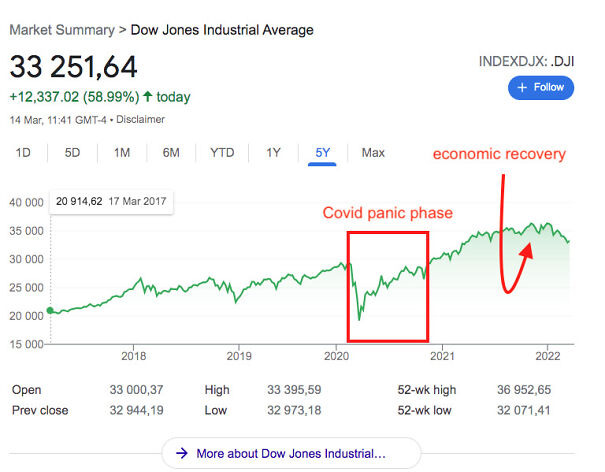
Oh and the dip at the end there in march is OBVIOUSLY sentiment-driven dip from the war.
Load More Replies...Convenience, that's the one I'm not seeing. Our team grew and moved to another floor, but boss didn't want me to move from office next to his, he often called out to me and moving floors meant more effort I believe. If I was out of the building then even more. From a bosses mind saving them a minute is more important than so much else.
Reminding myself that a lot of people can't do remote work, many of this reads quite whiny (Yeah, expecting downvotes now)
Nah. I'm blue collar and have to go to different job sites everyday. I support remote work where it's possible for every single one of the reasons above. To do otherwise would be petty.
Load More Replies...I was going to start with "unfortunately", but it isn't - it's just the nature of who I am. I'm one of those who needs to go somewhere other than home in order to work effectively. On the rare cases I've had to work remotely, it's driven me nuts.
72yr old business owner refuses to let us work from home, as if the 1.5yrs we were doing it during covid lockdown weren't proof it could be done. Her reason? None, other than the expensive office she pays for because she's old school and the 'prestige' of a woman lawyer having her own office is too much to let go of (yes she's living in the wrong damn decade). Also she has a need to micro-manage everything and everyone, me working at home means she has no control over me and she desperately needs to control people. Last time I work for an older person, at a small business, or for a woman.
Everybody - "Everybody should be allowed to work from home!" Teachers - "Great!" Everybody - "WAIT! I don't want my kids home with me"
I have several friends who are teachers, and they all hated teaching from home. They were happy to go back. Kids are not adults-- they generally need in person to pay attention and learn, not to mention develop socially and emotionally.
Load More Replies...Here's another big reason: remote workers make middle managers USELESS (or to be fair, "more useless"). Middle management as a position will be on the chopping block soon, so they're trying to force everyone back
Going back to work in an office seem like a step or ten backwards at this point.
*cries in teacher* I want to be in person. I don't want to pay gas prices to be there.
Understandable. As a former educator, I feel your pain, BUT, here (in Africa) our teachers managed with remote work, BUT only if the students had decent IT equipment. Poorer kids etc., totally lost out. It was a mess. Everyone would need the same quality of devices (or better) for the education thing to work.
Load More Replies...A complete and sudden ban of remote work was just one of the reasons I quit my job of 20 years. We proved during the pandemic that we could do our jobs without sitting in an office with a leaky ceiling. A week after the ban, I asked if there was an exception so I could stay home with my sick kid while working. Nope. So I called off, leaving them more short-staffed than usual. They had no one to cover the meeting that I could have attended virtually. Good riddance.
Go figure. The corporate machine that operates on the suffering of others doesn't want to cut anyone a break.
I returned to the office a year ago because corporate decided COVID was over. Looking for a new job.
It is amazing how Liberal/DemocRATS be so wrong on every single issue! Must be the blind hatred of anything that opposes them.
This week, i went to the office for one day. The "smart" building decided to open blinds at the exact moment when the sun moved in front of my desk and closed them when it moved away from the window and stopped burning my eyes out. That was enough office for me.
My boss has come right out and said that he doesn't want people working from home, because they goof off. I really want to quit, but I need to find a job that gives me the flexibility that I currently have AND working from home. I'm not going to quit a specialised job, as the openings come very rarely.
I was looking to work remote before Covid was a thing. I would be having anxiety attacks while walking (when i could walk), worrying about family members who can't be left alone, dealing with loss of other family members. Working remote really help me put pieces together and become more productive.
I say this as someone who worked in various jobs and locations, going back to a work environment is not a bad thing. Some people work better when working together, some people work better in an environment where the focus is on working. Not saying remote work is bad since it has its benefits too (family, child care, flexible hours) but saying that it's better for everyone to work at home is not right. I'm an introvert but I enjoy a good work environment with good people. Yeah it's stressful dealing with people but it has its perks too. Don't knock being able to talk to your coworkers and help each other out, share empathy and struggles. You can't quite get that from working at home.
Lots of posts on this topic. You can definitely see who "works" from home!
work from home before the pandemic, love it. not using the company's facilities, coffee, electricity, internet and save 3 hrs a day. Never going back, ever
In the decade before the pandemic plenty of large corporates were already requiring people to WfH 1 day a week as it allows them to save building costs. When Zoom and Teams came along, some moved to being home based and only coming in to the office 1-2 days for meetings. Some buildings were let go and the rest set up as co-working spaces. The pandemic just accelerated it. Companies can save a lot of overheads.
Digital academy didn't work for me. It may be different for others, but I cold not learn with all the distractions in my house. I don't believe that I could work either without going to YT or Instagram instead of working.
I have an office chair left over from an office that was sent to work from home in 1990.
First off, not your mate. Your buddy or pal or friend GUY. Not all Americans are slackes. As all Australians are not backward inbred animals.
There is a benefit to being face to face with coworkers: instant replies to a question. Don't give me IM/Slack or whatever - those notifications can be ignored. Phone calls are also not a guarantee of being answered at all, and not everyone leaves helpful voicemails, or listens to the ones you leave. Face to face means you can ask and answer in seconds and get on with the rest of your job. Now, this is the ONLY benefit to being in the same location as your coworkers, and certainly not an argument for returning to the office full time, but it is a negative to WFH that I'm not seeing being resolved yet, and it is an aspect that is impacting my productivity. I need an answer now, Jane, not in ten minutes when you finally open your IM, or listen to your voicemail.
Video chatting can be a good solution to that. With today’s technology, that is the least of our issues.
Load More Replies...Hugo I see you put as much effort into your profile as you probably do at your job. Probably
Just to voice a different opinion: my SIL runs a small financial business. Most of her workers are working from home, due to Covid, and she is a bit exasperated because she said they turned intoo primadonnas and their work has gone a lot more sloppy. I, too, find it hard to keep up focus and keep track of my time. So while I do want homeoffice, I think a few days at the office are a good idea, simply to keep us all connected to colleagues, bosses and the job.
If people cannot be productive at home, they should go into the office. Those who are productive should be able to choose.
Load More Replies...Awww, all these white collar jobs who are crying about having to return too the office. I am sure your waitreß, mailman, grocery mart employee, your local big box retail store employee, amazon delivery driver would all love to work from home- a segment of the population who can barely afford the cost of petro and rent. As some ole queen once asked - do you want some cheese with your whine?
So many good points. But, I wonder how many of these commenters expect teachers to go back to the classroom so that their kids can be in face-to-face classes. Teachers can make all the same points.
It's irrelevant. The difference in a class being held remotely and a class being held in person is much greater than the difference between typing on your computer at home and typing on your computer at an office building.
Load More Replies...Some solid reasons to not go back to work. Although, mentally, working from home has been awful for myself. I live alone and going to work is the only social outing I get. Most of the workers purely don't want to go back to work cause they're lazy and think they are entitled to do as they please.
Some solid reasons but most people are lazy? It's in the best interests of companies (whether they've realized it or not) to keep employees happy, so if it's not harming productivity, why can't employees do as they please. We're not children.
Load More Replies...Yeah, we all worked since day 1, mate. Going into your place of work does not mean you're the only worker. As long as I get my work done it's none of your business what else I do around it. I bet you spend quite a bit of time loafing off and call it networking or whatever.
Load More Replies...Which is exactly what I have done. But there are actually things people can do. They can just stop going to work. En masse. General strike. Crowd fund for strike funds. I'd contribute to that.
Load More Replies...If the pandemic taught us anything, it’s that most office workers can do the work from home, even better. I personally cannot work from home because of the nature of my job, but I fully support if you do. If your company doesn’t support it, luckily there are many others that do. There are countless remote jobs out there you can choose from.
It's the same thing said in different ways. Many white collar jobs do not require a physical presence. For companies paying huge amounts in rent and utilities, having your team free up those costs is beneficial to everyone. But every blue-collar and manual labour job doesn't have that option. And then there are all the people who could technically do their job remotely but can't (teachers for example), because we depend on their presence in order for us to do our jobs.
WFH is good for both the folks whose jobs can be done from home and those whose jobs require us to come in. If you have to go in, less people making small talk, less traffic, smaller lines for lunch, less micromanaging, the list goes on. You'd think these companies would like offloading their electric and internet costs. Bringing people back is about control. Same as tying your healthcare to your job. If you can WFH and your company is forcing you back, quit. Make this a hill to die on. It's better for the environment, for the people, and for the country (except the businesses that rely on people that commute. But bugger them. After capitalism, right ((lol))).
I posted a graph above showing that actually the WFH thing if anything has been great for capitalism, so share away.
Load More Replies...Me, an extrovert with practical work who mentally went to s**t while "working" from home :')
Well, I'm an extrovert myself, but for that I have family, friends and even acquaintances. In my 20+ career, I've only been able to have a social life within the office for 6 years in 3 different companies because the environment at these companies was adequate for that kind of interactions. But most of the time my social life started after the working hours.
Load More Replies...At least my employers learned something.. I was ALREADY working "remotely" when the pandemic hit...I was just doing it from an office building. I worked in Illinois (tech support) , and 90 percent of the people my team supported were either in another state, or another COUNTRY. But we were not allowed to work from home until COVID. Now, we're permanent.
I decided to copy paste this one here so yall can share it with your friendly neighbourhood capitalist. That's the Dow Jones. The US economy is booming. Without people going back to offices. The dip is covid. Note how it is now HIGHER than pre-covid. Put aside your "but my small business making girl scout cookies." We aren't talking about that, we are talking about corporate sector, white collar work. There is NO good reason to go back to offices. Screen-Sho...38-png.jpg 
Oh and the dip at the end there in march is OBVIOUSLY sentiment-driven dip from the war.
Load More Replies...Convenience, that's the one I'm not seeing. Our team grew and moved to another floor, but boss didn't want me to move from office next to his, he often called out to me and moving floors meant more effort I believe. If I was out of the building then even more. From a bosses mind saving them a minute is more important than so much else.
Reminding myself that a lot of people can't do remote work, many of this reads quite whiny (Yeah, expecting downvotes now)
Nah. I'm blue collar and have to go to different job sites everyday. I support remote work where it's possible for every single one of the reasons above. To do otherwise would be petty.
Load More Replies...I was going to start with "unfortunately", but it isn't - it's just the nature of who I am. I'm one of those who needs to go somewhere other than home in order to work effectively. On the rare cases I've had to work remotely, it's driven me nuts.
72yr old business owner refuses to let us work from home, as if the 1.5yrs we were doing it during covid lockdown weren't proof it could be done. Her reason? None, other than the expensive office she pays for because she's old school and the 'prestige' of a woman lawyer having her own office is too much to let go of (yes she's living in the wrong damn decade). Also she has a need to micro-manage everything and everyone, me working at home means she has no control over me and she desperately needs to control people. Last time I work for an older person, at a small business, or for a woman.
Everybody - "Everybody should be allowed to work from home!" Teachers - "Great!" Everybody - "WAIT! I don't want my kids home with me"
I have several friends who are teachers, and they all hated teaching from home. They were happy to go back. Kids are not adults-- they generally need in person to pay attention and learn, not to mention develop socially and emotionally.
Load More Replies...Here's another big reason: remote workers make middle managers USELESS (or to be fair, "more useless"). Middle management as a position will be on the chopping block soon, so they're trying to force everyone back
Going back to work in an office seem like a step or ten backwards at this point.
*cries in teacher* I want to be in person. I don't want to pay gas prices to be there.
Understandable. As a former educator, I feel your pain, BUT, here (in Africa) our teachers managed with remote work, BUT only if the students had decent IT equipment. Poorer kids etc., totally lost out. It was a mess. Everyone would need the same quality of devices (or better) for the education thing to work.
Load More Replies...A complete and sudden ban of remote work was just one of the reasons I quit my job of 20 years. We proved during the pandemic that we could do our jobs without sitting in an office with a leaky ceiling. A week after the ban, I asked if there was an exception so I could stay home with my sick kid while working. Nope. So I called off, leaving them more short-staffed than usual. They had no one to cover the meeting that I could have attended virtually. Good riddance.
Go figure. The corporate machine that operates on the suffering of others doesn't want to cut anyone a break.
I returned to the office a year ago because corporate decided COVID was over. Looking for a new job.
It is amazing how Liberal/DemocRATS be so wrong on every single issue! Must be the blind hatred of anything that opposes them.
This week, i went to the office for one day. The "smart" building decided to open blinds at the exact moment when the sun moved in front of my desk and closed them when it moved away from the window and stopped burning my eyes out. That was enough office for me.
My boss has come right out and said that he doesn't want people working from home, because they goof off. I really want to quit, but I need to find a job that gives me the flexibility that I currently have AND working from home. I'm not going to quit a specialised job, as the openings come very rarely.
I was looking to work remote before Covid was a thing. I would be having anxiety attacks while walking (when i could walk), worrying about family members who can't be left alone, dealing with loss of other family members. Working remote really help me put pieces together and become more productive.
I say this as someone who worked in various jobs and locations, going back to a work environment is not a bad thing. Some people work better when working together, some people work better in an environment where the focus is on working. Not saying remote work is bad since it has its benefits too (family, child care, flexible hours) but saying that it's better for everyone to work at home is not right. I'm an introvert but I enjoy a good work environment with good people. Yeah it's stressful dealing with people but it has its perks too. Don't knock being able to talk to your coworkers and help each other out, share empathy and struggles. You can't quite get that from working at home.
Lots of posts on this topic. You can definitely see who "works" from home!
work from home before the pandemic, love it. not using the company's facilities, coffee, electricity, internet and save 3 hrs a day. Never going back, ever
In the decade before the pandemic plenty of large corporates were already requiring people to WfH 1 day a week as it allows them to save building costs. When Zoom and Teams came along, some moved to being home based and only coming in to the office 1-2 days for meetings. Some buildings were let go and the rest set up as co-working spaces. The pandemic just accelerated it. Companies can save a lot of overheads.
Digital academy didn't work for me. It may be different for others, but I cold not learn with all the distractions in my house. I don't believe that I could work either without going to YT or Instagram instead of working.
I have an office chair left over from an office that was sent to work from home in 1990.
First off, not your mate. Your buddy or pal or friend GUY. Not all Americans are slackes. As all Australians are not backward inbred animals.
There is a benefit to being face to face with coworkers: instant replies to a question. Don't give me IM/Slack or whatever - those notifications can be ignored. Phone calls are also not a guarantee of being answered at all, and not everyone leaves helpful voicemails, or listens to the ones you leave. Face to face means you can ask and answer in seconds and get on with the rest of your job. Now, this is the ONLY benefit to being in the same location as your coworkers, and certainly not an argument for returning to the office full time, but it is a negative to WFH that I'm not seeing being resolved yet, and it is an aspect that is impacting my productivity. I need an answer now, Jane, not in ten minutes when you finally open your IM, or listen to your voicemail.
Video chatting can be a good solution to that. With today’s technology, that is the least of our issues.
Load More Replies...Hugo I see you put as much effort into your profile as you probably do at your job. Probably
Just to voice a different opinion: my SIL runs a small financial business. Most of her workers are working from home, due to Covid, and she is a bit exasperated because she said they turned intoo primadonnas and their work has gone a lot more sloppy. I, too, find it hard to keep up focus and keep track of my time. So while I do want homeoffice, I think a few days at the office are a good idea, simply to keep us all connected to colleagues, bosses and the job.
If people cannot be productive at home, they should go into the office. Those who are productive should be able to choose.
Load More Replies...Awww, all these white collar jobs who are crying about having to return too the office. I am sure your waitreß, mailman, grocery mart employee, your local big box retail store employee, amazon delivery driver would all love to work from home- a segment of the population who can barely afford the cost of petro and rent. As some ole queen once asked - do you want some cheese with your whine?
So many good points. But, I wonder how many of these commenters expect teachers to go back to the classroom so that their kids can be in face-to-face classes. Teachers can make all the same points.
It's irrelevant. The difference in a class being held remotely and a class being held in person is much greater than the difference between typing on your computer at home and typing on your computer at an office building.
Load More Replies...Some solid reasons to not go back to work. Although, mentally, working from home has been awful for myself. I live alone and going to work is the only social outing I get. Most of the workers purely don't want to go back to work cause they're lazy and think they are entitled to do as they please.
Some solid reasons but most people are lazy? It's in the best interests of companies (whether they've realized it or not) to keep employees happy, so if it's not harming productivity, why can't employees do as they please. We're not children.
Load More Replies...Yeah, we all worked since day 1, mate. Going into your place of work does not mean you're the only worker. As long as I get my work done it's none of your business what else I do around it. I bet you spend quite a bit of time loafing off and call it networking or whatever.
Load More Replies...Which is exactly what I have done. But there are actually things people can do. They can just stop going to work. En masse. General strike. Crowd fund for strike funds. I'd contribute to that.
Load More Replies...
 Dark Mode
Dark Mode 

 No fees, cancel anytime
No fees, cancel anytime 


